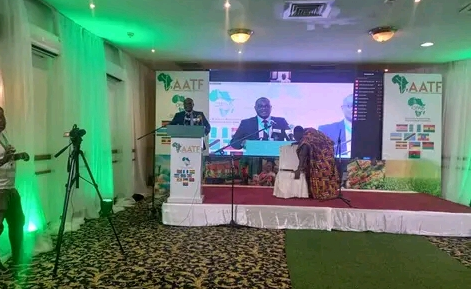
OFAB honours stakeholders in Africa
The second edition of Open Forum on Agricultural Biotechnology (OFAB) Day has been marked in Ghana with deserving journalists, academics and other key stakeholders and crusaders receiving awards for their various contributions in the promotion of science-led agriculture in Africa.
The OFAB Project in Africa facilitates constructive conversations among key stakeholders and decision-makers on agricultural biotechnology.
Background
OFAB, a project of AATF, is funded by the Bill and Melinda Gates Foundation and is being implemented in ten African countries—Kenya, Uganda, Tanzania, Nigeria, Ghana, Burkina Faso, Ethiopia, Mozambique, Malawi and Rwanda.
Among its objectives are to contribute to informing policy decision making processes on matters of agricultural biotechnology through the provision of factual, well researched and scientific information; enhance targeted capacity strengthening that will improve communication across all sectors interested in biotechnology for African agricultural development, and also to forge strategic alliances for optimization of resources through convening and encouraging inter-institutional networking and knowledge sharing in the agricultural biotechnology space.
Agricultural biotechnology is a proven scientific tool that addresses some of farmers’ most bothersome problems like inadequate water, insufficient soil nutrients and pests or insect invasions.
This is because through biotechnology, seeds yield more per acre, plants naturally resist specific insect, pests and diseases, and farming techniques improve soil conservation.
Proponents of biotechnology strongly advocate its application in agriculture to guarantee returns on investments, despite the current challenges the weather presents.
Nominees
The nominees for awards were carefully selected by OFAB chapter countries in consultation with OFAB boards.
The former Tanzanian President Jakaya Mrisho Kikwete, was one of the nominees awarded for his role in supporting farmers' rights to access modern agricultural technologies and innovations.
The rest are Professor Marian Dorcas Quain, Chief Research Scientist at the Crop Research Institute (CRI) of the Council for Scientific and Industrial Research (CSIR); Prof. James Bokosi of Malawi; Mr Kabir Ibrahim of Nigeria; Dr Mandefro Nigussie of Ethiopia; Prof. Morris Ogenga Latigo of Uganda, Prof. Chantal Zoungrana Kabore of Burkina Faso;; Dr Patrick Karangwa of Rwanda; Dr Roda sansao Nuvunga of Mozambique, and Mr Daniel Mugo magondu of Kenya.
Role of OFAB
The Director in charge of Product Development and Commercialisation of AATF, Dr Emmanuel Okogbenin, said the nominees were honoured for their individual roles in the advancement of agriculture biotechnology in their respective countries and Africa as a whole.
"The nominated policymakers, scientists and farmers have championed biotechnology not for personal gain, but because of belief in its potential to uplift the people's livelihoods," he noted, adding "Through their example, we learn that each one of us, in our areas of expertise and influence can promote the role of science in the Africa's development."
Create awareness
For his part, the Minister of Environment, Science, Technology and Innovation, Dr Kwaku Afriyie, in a speech read on his behalf commended OFAB Africa for the various roles they had been playing to ensure the continent’s food security.
He expressed the concern that in spite of the potential of biotechnology, it had been met with resistance, usually grounded in myths and misconceptions.
"Biotechnology as relatively new science has been met with resistance in Ghana due to lack of understanding and misinformation about the technology in the public," he said.
For Dr Afriyie, "The biggest challenge, which many hold for other African nations, is the knowledge gap between scientists and the public who are the end users of the biotech products."
That, he noted, it was important that OFAB continue to create awareness about the technology in order to allay the fears of the public about what biotechnology was all about.
Consistency
The Acting Director-General of CSIR, Prof. Mike Yaw Osei-Atweneboana, in a speech read on his behalf, said OFAB since its establishment August 18, 2011, had consistently facilitated dialogues and conversations to promote the role of science, technology and innovation, particularly agricultural biotechnology in Ghana all aimed at ensuring that the country was food secure.
He has, therefore, charged the nominees who received awards to continue to lead conversations around the technology in their respective countries.
Alternatives
In his remarks, a Senior Research Scientist at the CSIR-Science and Technology Policy Research Institute (STEPRI), Dr Richard Ampadu Ameywas, who is also the OFAB Ghana Coordinator, pledged the readiness of OFAB Ghana to continue to deepen understanding about biotechnology in the country.
For him, it was not part of OFAB Ghana’s goals to force the technology on Ghanaians but rather to offer them better understanding of what the technology seeks to do.
Speaking at the event, the Vice President of the Ghana Journalist Association (GJA), Mrs Linda Asante-agyei, said OFAB Ghana had since its inception being working with the media and the government to propagate the good news and the benefits of agricultural biotechnology to policy makers and other stakeholders.
A Burkinabe journalist, Mr Jeremy Quedraogo, was adjudged winner of the OFAB Africa 2022 media awards.
